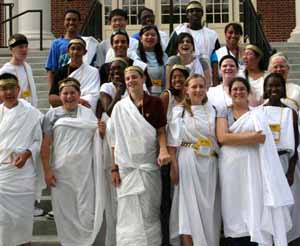 |
Ambiences and Tendencies
Latin: No Longer a Dead Language
Elaine Jordan
“Latin, Resurrected” is the title of an article in US News and World Report that recently came to my hands. With a surprise close to astonishment the reporter notes that Latin classes are filling up in middle and high schools across the nation. The number of students taking the National Latin Exam has risen from 5,000 in 1977 to more than 135,000 in 2007.

Latin resurrects - Students at the Boston Latin Academy in their togas |
Dynamic, enthusiastic teachers implement engaging teaching styles to keep the students “hooked,” the article notes. For example they wear togas in class, they converse and sing songs. I believe, however, the article stops short at understanding the cause for Latin’s resurrection. The article suggests that the resurgence is linked to increased interest in SAT preparation or youth’s obsession with Harry Potter and his Latin spells. I don’t agree. I believe that the students rather enjoy the discipline, logical structure and challenge of learning Latin – yes, they actually like Latin!
The article also fails to point out the many Catholic homeschoolers who have added Latin to the curriculum and are enrolling their students in the National Latin Exam.
Latin, which used to be a required course in all Catholic schools and good prep schools, was thrown out of the curriculum in most schools in the 1960s. No more Latin Mass - no need for Latin, was the reasoning for the Catholics, I suppose. In secular schools, the new methods of teaching considered the Latin language and grammar too structured and stuffy. Latin was finally dead, it was announced.
Well, Latin refused to die. As Catholic parents re-discovered the Latin Tridentine Mass, they wanted to learn Latin, the official language of the Church. Almost every traditional parish today has a Latin class for adults and children. Homeschooling parents, as I just said, are adding Latin to their curriculum. They want their children to learn the meaning and have the wealth of beautiful hymns, chants and prayers that are part of our heritage.
Latin resources abound on the net for Catholics interested in learning the language or adding it to their curriculum. I got involved in re-studying Latin for a while by way of the Quasillum listserv. In the introductory group, participants cover a chapter of Wheelock's Latin each week, submitting the exercises and comparing notes with the translations of others.

Young ladies study Latin at a Catholic College in 1936 |
If you want to build up your vocabulary, there are thousands of pictures and visual learning aids on Schola. The Latinum podcast – another free resource - has online lessons that include grammar, question-answer conversations, and dialogues with correct pronunciation and lots of repetition. It’s the next best thing to an actual class.
Are you lacking the time to review the programs now available? You can take advantage of the research done by Catholic Homeschooling Support, or by the Love to Learn site. They provide a host of varied links to assist you in learning or teaching Latin.
The reasons for Latin’s endurance have always been solid. It gives students a better understanding of language and grammar, develops their vocabulary and is beneficial in recognizing medical and scientific terminology. Yes, it raises SAT scores, but more importantly, it lends a critical element to the thinking and gives a keen edge to the perceptive and reasoning powers. This, in my view, is a better reason to learn Latin than to improve a test score.
Many years ago, I came across a book by Frances Ellis Sabin titled The Relation of Latin to Practical Life (1913). Its nine chapters demonstrate Latin’s influence on the English language, literature, the romance languages, mental training, art, the sciences, the professions, history and culture.
To close this article, let me share some pages with you from Chapter One, titled “Latin makes the English language more intelligible. If you have any doubts about the practicality of this supposedly “dead” language, I hope these pages will put them to rest and entice you to study Latin – or include it in your homeschooling curriculum.
1. Latin is the key to understand the root of common words and the meaning of unusual words. Why not learn the meaning of the root word and thus avoid the use of the dictionary so often?
2. The following underlined words show how much our language is indebted to Latin.
3. The English languages has many Latin words that have not changed since the time of the Romans
4. Almost every scientific invention is coined from Greek or Latin
5. Latin helps one to spell correctly (without spell-check)
6. The Latin student understands these common abbreviations
7. Finally, Latin is the foundation of French, Italian, Spanish, Portuguese and Romanian. It provides a good basis for the study of language in general. The black in the pictures below show the percentage of words in Italian, French and Spanish which a Latin student does not need to look up in the dictionary!

Posted June 26, 2009
|

Related Topics of Interest
 Latin - an Indispensible Factor of Unity Latin - an Indispensible Factor of Unity
 Language Is the Dress of Thought Language Is the Dress of Thought
 True Friends of People Are Traditionalists True Friends of People Are Traditionalists
 Please Say Children, Not Kids Please Say Children, Not Kids
 R-CR in the Tendencies, Ideas and Facts R-CR in the Tendencies, Ideas and Facts

Related Works of Interest
|
|
Ambiences | Cultural | Home | Books | CDs | Search | Contact Us | Donate

© 2002- Tradition in Action, Inc. All Rights Reserved
|
 |

|